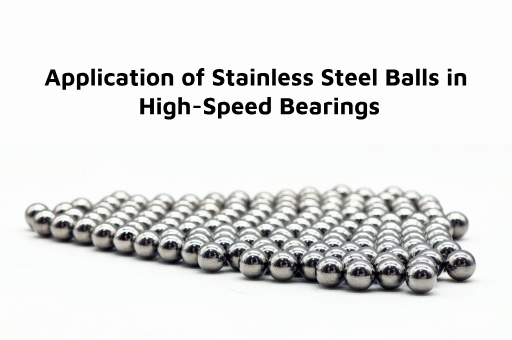
 Home > News
Home > NewsHigh-speed bearings are crucial components in various high-performance machinery, including aerospace equipment, medical devices, automotive engines, and industrial machinery. These bearings require materials that can withstand extreme conditions, such as high rotational speeds, elevated temperatures, and significant mechanical stress. Stainless steel balls are often chosen for high-speed bearings due to their superior properties, including high strength, corrosion resistance, and excellent fatigue life.

1. Corrosion Resistance:Stainless steel is renowned for its resistance to corrosion, which is vital for bearings operating in harsh environments. This resistance ensures the longevity and reliability of the bearings, reducing maintenance costs and downtime.
2. High Strength and Hardness:Stainless steel balls exhibit high tensile strength and hardness, which are essential for bearing applications. These properties enable the bearings to handle high loads and resist deformation under stress, maintaining their performance over time.
3. Fatigue Resistance:Fatigue resistance is critical for high-speed applications, where bearings are subjected to continuous cyclic loads. Stainless steel's ability to resist fatigue ensures that the bearings can endure prolonged operation without failure.
4. Thermal Stability:High-speed bearings generate significant heat due to friction. Stainless steel maintains its mechanical properties at elevated temperatures, ensuring the bearings perform reliably under thermal stress.
The precision grade of stainless steel balls directly influences the performance of high-speed bearings. Higher precision grades, characterized by tighter tolerances in sphericity, diameter, and surface finish, lead to smoother operation, reduced vibration, and lower noise levels. This precision is achieved through advanced manufacturing techniques, including:
Cold Heading: This process forms the initial shape of the balls from wire rods.
Heat Treatment: Enhances the hardness and strength of the balls.
Grinding: Refines the shape and size of the balls to meet precise specifications.
Lapping and Polishing: Improves the surface finish, ensuring minimal friction and wear during operation.
1. Aerospace:In aerospace applications, high-speed bearings are essential for jet engines, turbine systems, and control surfaces. Stainless steel balls provide the necessary durability and reliability in these critical components, ensuring safe and efficient operation.
2. Medical Devices:High-speed bearings are used in medical devices such as dental drills and surgical instruments, where precision and reliability are paramount. Stainless steel balls offer the required biocompatibility and corrosion resistance, ensuring the devices perform consistently.
3. Automotive:Automotive engines, particularly in performance and racing vehicles, rely on high-speed bearings for components like turbochargers and transmission systems. Stainless steel balls contribute to the efficiency and longevity of these high-stress components.
4. Industrial Machinery:In industrial applications, high-speed bearings are used in various machinery, including electric motors, pumps, and compressors. Stainless steel balls enhance the performance and lifespan of these bearings, reducing maintenance costs and improving operational efficiency.
Stainless steel balls play a vital role in the performance and reliability of high-speed bearings across various industries. Their superior properties, coupled with precision manufacturing techniques, make them the material of choice for applications requiring high strength, durability, and corrosion resistance. As technology advances, the demand for high-speed bearings with enhanced performance will continue to grow, further solidifying the importance of stainless steel balls in this field.
View More(Total0)Comment Lists